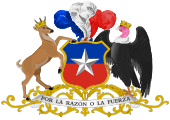Constitution of Chile
 |
|---|
|
The Political Constitution of the Republic of Chile of 1980 (Spanish: Constitución Política de la República de Chile) is the fundamental law in force in Chile. It was approved and promulgated under the military dictatorship of Augusto Pinochet, being ratified by the Chilean citizenry through a referendum on September 11, 1980, although being held under restrictions and without electoral registers. The constitutional text took effect, in a transitory regime, on March 11, 1981 and then entered into full force on March 11, 1990, with the transition of democracy. It was amended for the first time on 1989 (through a referendum) and afterwards, on 1991, 1994, 1997, 1999, 2000, 2001, 2003, 2007, 2008, 2009, 2010, 2011, 2012, 2013, 2014, 2015, 2017, 2018, 2019, 2020, and 2021, these last three with relation the current constituent process. On September 2005, under Ricardo Lagos' presidency, a large amendment of the Constitution was approved by parliamentarians, removing from the text some of its more anti-democratic dispositions coming from Pinochet's regime, such as senators-for-life and appointed senators, as well as the Armed Forces' warranty on the democratic regime.
Finally, soon after a series of popular protests on October 2019, on November 15, 2019, a political agreement between parties with parliamentary representation open the call of a national referendum on the proposal of writing a new Constitution and the mechanism to draft it. The plebiscite was held on October 25, 2020, resulting in the approval of drafting a new fundamental charter, as well, as choosing a Constitutional Convention fully elected through popular vote to fulfill this objective. The members of the Convention were elected on May 2021, and the Assembly first met on July 4, 2021.

Legitimacy[]
This section needs expansion. You can help by . (January 2015) |
According to the law professor Camel Cazor Aliste, the Constitution of 1980 has problems of legitimacy stemming from two facts. First, the constitutional commission was not representative of the political spectrum of Chile since its members had been handpicked by the Pinochet dictatorship, and opponents of the regime had been deliberately excluded. Also, the constitution's approval was achieved by the government in a controversial and tightly controlled referendum in 1980.[1] Campaigning for the referendum was irregular, with the government calling people to vote positively on the reform, and also using radio and television commercial spots, while the opposition urging people to vote negatively were only able of doing small public demonstrations, without access to television time and limited radio access. There was no electoral roll for this vote, given that the register had been burned during the dictatorship. There were multiple cases of double voting, with at least 3000 CNI agents doing so.[2]
Despite controversy about its conception, it has been frequently modified (nearly 20 times) since democracy was reinstated, with corresponding Parliamentary approval.
A document from September 13, 1973, show that Jaime Guzmán was by then already tasked by the Junta to study the creation of a new constitution.[3]
Accusations of bias in legislative apportionment and election mechanisms[]
It has been argued the 1980 Constitution was designed to favour the election of right-wing legislative majorities. Several rounds of constitutional amendments have been enacted since 1980 to correct this concern.[4][5]
Timeline of Constitutions[]
- Reglamento para el arreglo de la Autoridad Ejecutiva Provisoria de Chile 1811
- Reglamento Constitucional 1812
- Reglamento para el gobierno Provisorio 1814
- Constitución de 1818
- Constitución de 1822
- Constitución de 1823
- Ensayo Federal de 1826
- Constitución de 1828
- Constitución de 1833: Written among others by Mariano Egaña and
- Reinterpreted after the 1891 Chilean Civil War augmenting the power of the National Congress of Chile
- Constitución de 1925: Written among others by Arturo Alessandri Palma and
- Constitución de 1980: Written among others by Jaime Guzmán
- Has been amended in 1989, 1991, 1994, 1997, 1999, 2000, 2001, 2003, 2005, 2007, 2008, 2009, 2010, 2011, 2012, 2013, 2014, 2015, and 2017.
See also[]
References[]
- ^ Cazor Aliste, Camel (2000). "Democracia y constitucion en Chile". Revista de Derecho. Austral University of Chile. IX: 25–34. Archived from the original on May 18, 2015. Retrieved April 30, 2015.
- ^ "Revelan fraude en plebiscito de constitución de 1980". La Nación (Chile). 2012. Archived from the original on March 4, 2016. Cite journal requires
|journal=(help) - ^ Basso Prieto, Carlos (November 5, 2013). "Los informes secretos de la CIA sobre Jaime Guzmán". El Mostrador. Retrieved September 29, 2021.
- ^ Carey, John M. Malapportionment and ideological bias in Chilean electoral districts. Dartmouth College. May 18, 2015.
- ^ Carey, John. Chile’s electoral reform. Global Americans. May 27, 2015.
General references[]
- Brief review of Chile's constitutional history - Chile's Library of Congress (in Spanish) at archive.today (archived January 1, 2013)
External links[]
| Wikisource has original text related to this article: |
| Spanish Wikisource has original text related to this article: |
- 2005 recasting of the 1980 Constitution (PDF version) (Spanish original) at the Wayback Machine (archived December 7, 2006)
- Official translation of the original 1980 Constitution (PDF file) at the Wayback Machine (archived 2020-07-24)
- Text of Chilean constitutions - Library of Congress of Chile (Spanish original) at archive.today (archived December 10, 2005)
- Untying the knot (The Economist, Oct 21st 2004)
- www.constitutionnet.org
- Constitutions of Chile
- 1980 in Chilean law
- Government of Chile

